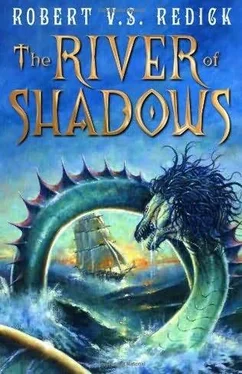Robert Redick - The River of Shadows
Здесь есть возможность читать онлайн «Robert Redick - The River of Shadows» весь текст электронной книги совершенно бесплатно (целиком полную версию без сокращений). В некоторых случаях можно слушать аудио, скачать через торрент в формате fb2 и присутствует краткое содержание. Жанр: Фэнтези, на английском языке. Описание произведения, (предисловие) а так же отзывы посетителей доступны на портале библиотеки ЛибКат.
- Название:The River of Shadows
- Автор:
- Жанр:
- Год:неизвестен
- ISBN:нет данных
- Рейтинг книги:4 / 5. Голосов: 1
-
Избранное:Добавить в избранное
- Отзывы:
-
Ваша оценка:
- 80
- 1
- 2
- 3
- 4
- 5
The River of Shadows: краткое содержание, описание и аннотация
Предлагаем к чтению аннотацию, описание, краткое содержание или предисловие (зависит от того, что написал сам автор книги «The River of Shadows»). Если вы не нашли необходимую информацию о книге — напишите в комментариях, мы постараемся отыскать её.
The River of Shadows — читать онлайн бесплатно полную книгу (весь текст) целиком
Ниже представлен текст книги, разбитый по страницам. Система сохранения места последней прочитанной страницы, позволяет с удобством читать онлайн бесплатно книгу «The River of Shadows», без необходимости каждый раз заново искать на чём Вы остановились. Поставьте закладку, и сможете в любой момент перейти на страницу, на которой закончили чтение.
Интервал:
Закладка:
Thasha’s eyes streamed with tears. All that power was waiting, but not for her. Yes, she had been Erithusme. And Thasha Isiq-that girl had been an invention, a disguise, a hiding place when the sorceress stood cornered by her foes, expecting to be killed. Cornered (it must have been) very close to the big house on Maj Hill, in Etherhorde, where lived one admiral’s wife, Clorisuela Isiq, longing for children she could never have. Thasha could picture the bargain: a daughter born sound and healthy, in exchange for one chamber of her mind in which to hide my soul. A pact between mage and mother, both desperate in their way. Had they known, even then, that they were creating a hollow shell, a child whom Erithusme would slowly replace?
But like most desperate schemes, this one had failed. For the shell had wanted her life, wanted to breathe and dance and learn and love, and Erithusme had been powerless to stop her. Year by year the mortal girl’s mind had grown stronger, bolder, and the great mage had retreated. As with the Waking Spell, Erithusme had misjudged the riotous strength of life, its habit of mutiny, its defiance. Thasha’s mind called out to Ramachni, vicious with despair. If only I had withered, died inside, the way you wanted. Then you’d have your champion, then you’d win.
He answered fiercely: No, Thasha! That was never the plan!
But of course it was. Erithusme would have had a new body, just as Arunis had once seized the body of a prison guard. And the whole, pointless shadow-play of Thasha’s life, from her first breath in the midwife’s hands to her shudder of joy in Pazel’s arms-would have been expunged, spat out, blackened and unmade.
I’m so sorry, Ramachni. I can die for this fight. I can’t go back and not have lived.
Thasha, you have felt her power; it is yours and yours alone, if only you No!
She blotted out his voice-and that other voice, that woman’s. They were trying to take everything from her. Past, future, lovers, life. Worse, they were trying to make her renounce it. Maybe she could wish that her soul had died, leaving her body for Erithusme. But she hadn’t. She was here, a woken animal called human, and she would live until those blades struck her down.
“Hold fast!” cried Vispek suddenly. “Neda and I are going to stand up. Our bodies may stop the blades, or deflect them-”
“No!” cried the others, trying to restrain them.
“Do not interfere! There is no other-”
“Wait, Cayer,” said Ramachni.
Atop the wall, behind Arunis and the idiot, a third figure appeared. It was Pazel, crawling up from the inside of the wall, rising unsteadily to his feet. Stealth in his movements, Fiffengurt’s blackjack in his hand; and just as Thasha felt the first nick of the whirling blades he stepped forward and struck the idiot a crushing blow to the head.
The blades were gone. The pit was gone. On the wall, the idiot crumpled, and the Nilstone slipped from his fingers. Arunis whirled and lunged at Pazel, lifted him by the neck-then tossed him down again as he saw his prize rolling slowly, inexorably, toward the edge of the wall.
Thasha gasped: her despair was gone as well. Everything had slowed except her mind, her hammering heart. She saw Arunis diving for the Nilstone; saw her hand groping along Hercol’s twisted arm, saw the mage seize the Stone and topple with it over the wall, saw herself sprint forward to meet him, weightless, almost laughing. She saw his lips move, his hands blackening where they gripped the Stone; saw a dark hole open in the river and something leap like a fish into the sky; saw the perfection in herself as she swung Ildraquin and severed Arunis’ head from his body before he struck the ground.
A Fighting Chance
When they gathered around her she said nothing. Daybreak was nearing after all; the sky over the tower glowed, lamplight through musky wine. The corpse of the mage looked like any other. The Nilstone looked like a hole in the world, lying there on the grass between her knees. She could feel its draw, its invitation. Once before it had been her servant, and it would be so again. For a price.
Hercol was helped to her side; he bent down stiffly and kissed her on the brow. The others murmured, praised her deed. All save Pazel, who was still atop the wall, shooting glances at her, then looking quickly away.
Ramachni came next. His tongue flicked her arm like a tiny paintbrush. “Dearest,” he said, “can you have believed that I would join any scheme to make you wither and die?”
She gave him no answer, not even a glance.
“Mind you,” he said, “what I did agree to gave me no joy. And the only person in all this world who could have persuaded me was you. I think you understand, now. We were minutes from death. Arunis had killed nearly everyone who opposed him, and wounded us terribly. His foul servants had chased us over land and sea, and cornered us at last in Etherhorde-on Maj Hill, to be exact. They were moving door to door, sniffing like bloodhounds, and he was there among them at the height of his powers. We had to think quickly, Mistress, and our options were few.”
Pazel touched his throat, wincing. He could still feel Arunis’ fingers, dry and cruel as talons, and knew the mage had been on the point of snapping his neck. He sat down carefully atop the wall. They had done it, they had killed him. He had stopped believing the moment would come.
The first to reach him was Ensyl. She ran to his side, lifted his hand with effort, kissed his palm. He managed a brief, bone-weary smile. Ensyl ran across the wall and looked down.
“An inner staircase! So that’s how you managed the climb. But Pazel, where is Ibjen? Did he drown?”
Pazel shook his head. “The River took him. He could be anywhere, in any world. The same thing would have happened to me if he hadn’t pushed me through that gap.”
Ensyl was silent a moment, then looked over her shoulder again. “You have killed the idiot,” she said.
Pazel looked at the pale, twisted body. In death so very human. A prisoner, with a prisoner’s filth and hair.
“Diadrelu said we’d all be killers before the end,” he said. “I was always afraid she was right.”
“In a strange way, the idiot helped you do it, by knocking you into the river,” said Ensyl. “I wonder if some part of him wanted it. To be a tol-chenni is surely a fate worse than death.”
Pazel shuddered. He looked down at Neeps, crouching at Thasha’s side. They would cure him. They had to. It was impossible even to consider that they might fail.
“Admiral Isiq was away at sea,” said Ramachni, “and the servants gone for the night. Clorisuela was alone. You bargained quickly, Mistress. You offered her a child: the one she could never have by natural means. But your power had limits. You could induce Clorisuela’s body to form a new child in her womb, but you could not give that child a soul, as Nature does in her omnipotence. The only soul you had to offer was your own.
“But Clorisuela wanted nothing to do with creating such a creature-an infant with a mind twelve centuries old-and no entreaties on your part would move her. She said that it was perhaps time for your long life to end. ‘And if not,’ she said, ‘if you truly wish to hide within a daughter of mine, then you must become her. Change your own soul, and make it like that of a newborn. Hide your memories and your feelings and your magic away not just from others, but from her as well, entirely. Give her sixteen natural years-and one more after that to learn the truth. And finally, when those years have passed: let your memories and mind return to her only if she wants them-purely, and with no compulsion, and no regrets.’ Those were Clorisuela’s terms. And you, Mistress, called them just, and agreed.”
Читать дальшеИнтервал:
Закладка:
Похожие книги на «The River of Shadows»
Представляем Вашему вниманию похожие книги на «The River of Shadows» списком для выбора. Мы отобрали схожую по названию и смыслу литературу в надежде предоставить читателям больше вариантов отыскать новые, интересные, ещё непрочитанные произведения.
Обсуждение, отзывы о книге «The River of Shadows» и просто собственные мнения читателей. Оставьте ваши комментарии, напишите, что Вы думаете о произведении, его смысле или главных героях. Укажите что конкретно понравилось, а что нет, и почему Вы так считаете.












